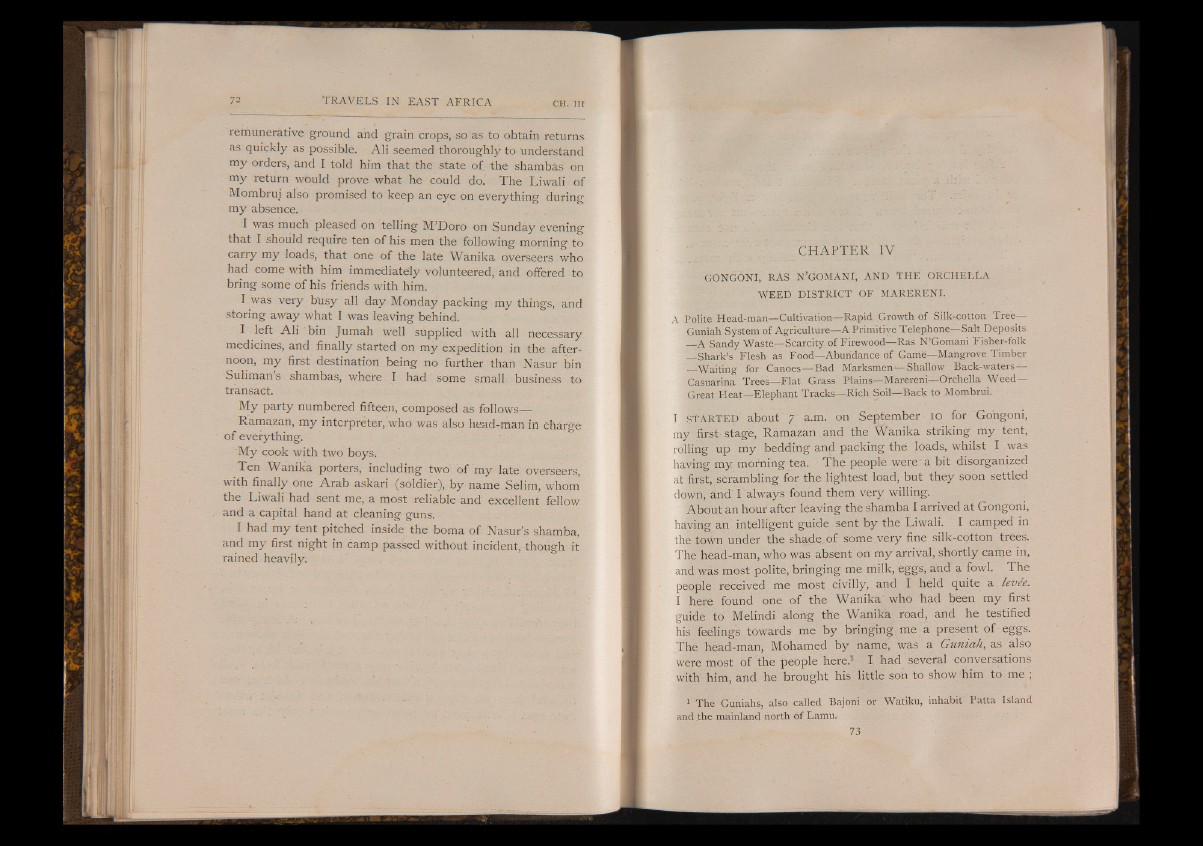
remunerative ground and grain crops, so as to obtain returns
as quickly as possible. Ali seemed thoroughly to Understand
my orders, and I told him that the state of the shambas on
my return would prove what he could do. The Liwali of
Mombrui also promised to keep an eye on everything during
my absence.
I was much pleased on telling M’Doro on Sunday evening
that I should require ten of his men the following morning to
carry my loads, that one of the late Wanika overseers who
had come with him immediately volunteered, and offered to
bring some of his friends with him.
I was very busy all day Monday packing my things, and
storing away what I was leaving behind.
I left Ali bin Jumah well supplied with all necessary
medicines, and finally started on my expedition in the afternoon,
my first destination being no further than Nasur bin
Suliman s shambas, where I had some small business to
transact.
My party numbered fifteen, composed as follows—
Ramazan, my interpreter, who was also head-man in charge
of everything.
My cook with two boys.
Ten Wanika porters, including two of my late overseers,
with finally one Arab askari (soldier), by name Selim, whom
the Liwali had sent me, a most reliable and excellent fellow
and a capital hand at cleaning guns.
I had my tent pitched inside the boma of Nasur’s shamba,
and my first night in camp passed without incident, though it
rained heavily.
CH A P T ER IV
GONGÔNI, RAS N’GOMANI, AND THE ORCHELLA
, WEED DISTRICT OF MARERENI.
A Polite Head-man— Cultivation— Rapid Growth of Silk-cotton Tree—
Guniah System of Agriculture— A Primitive Telephone— Salt Deposits
— A Sandy Waste— Scarcity of Firewood— Ras N’Gomani Fisher-folk
— Shark’s Flesh as Food— Abundance of Game— Mangrove Timber
—Waiting for Canoes— Bad Marksmen— Shallow Back-waters —
Casuarina Trees— Flat Grass Plains— Marereni— Orchella W e e d -
Great Heat— Elephant Tracks— Rich Soil— Back to Mombrui.
I STARTED about 7 a.m. on September io for Gongoni,
my first- stage, Ramazan and the Wanika striking my tent,
rolling up my bedding and packing the loads, whilst I was
having my morning tea. The people were'a bit disorganized
at first, scrambling for the lightest load, but they soon settled
down, and I always found them very willing.
About an hour after leaving the shamba I arrived at Gongoni,
having an intelligent guide sent by the Liwali. I camped in
the town under the shade, of some very fine silk-cptton trees.
The head-man, who was absent on my arrival, shortly came in,
and was most polite, bringing me milk, eggs, and a fowl. The
people received me most civilly, and I held quite a levée.
I here found one of the Wanika who had been my first
guide to Melindi along the Wanika road, and he testified
his feelings towards me by bringing me a present of eggs.
The head-man, Mohamed by name, was a Guniah, as also
were most of the people here.1 I had several conversations
with him, and he brought his little son to show him to me ,
1 The Guniahs, also called Bajoni or Watiku, inhabit Patta Island
and the mainland north of Lamu.